Ethics in Collaborative Research: MBA, Bucharest University, Romania
VerifiedAdded on 2023/04/21
|6
|2503
|460
Essay
AI Summary
This essay delves into the ethical considerations surrounding collaborative research, particularly within the context of co-authorship, dissemination of research outcomes, and the dynamics of research teams. It highlights the challenges posed by collaborative research due to the involvement of multiple researchers, resources, and institutions. The discussion covers ethical issues such as guest and ghost authorship, the importance of intellectual property rights, and the need for researchers to engage actively with the public while respecting participant dignity and confidentiality. Furthermore, the essay emphasizes the ethical responsibilities of research teams, including critical reflection, adherence to ethical standards, and addressing potential risks to both participants and researchers themselves. The goal is to provide a comprehensive understanding of the ethical landscape in collaborative research, ensuring that research is conducted responsibly and with integrity.
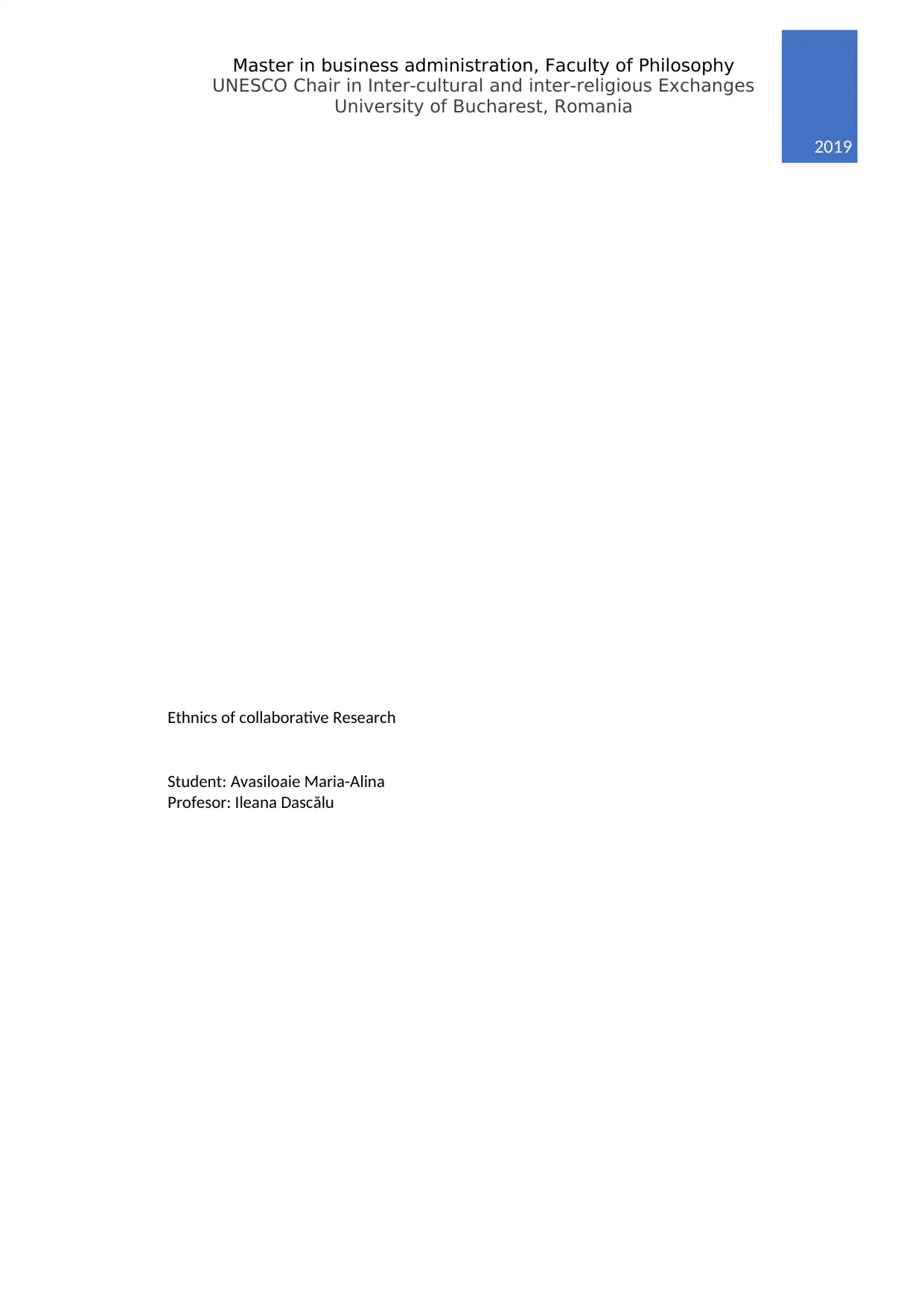
Master in business administration, Faculty of Philosophy
UNESCO Chair in Inter-cultural and inter-religious Exchanges
University of Bucharest, Romania
2019
Ethnics of collaborative Research
Student: Avasiloaie Maria-Alina
Profesor: Ileana Dascălu
UNESCO Chair in Inter-cultural and inter-religious Exchanges
University of Bucharest, Romania
2019
Ethnics of collaborative Research
Student: Avasiloaie Maria-Alina
Profesor: Ileana Dascălu
Paraphrase This Document
Need a fresh take? Get an instant paraphrase of this document with our AI Paraphraser
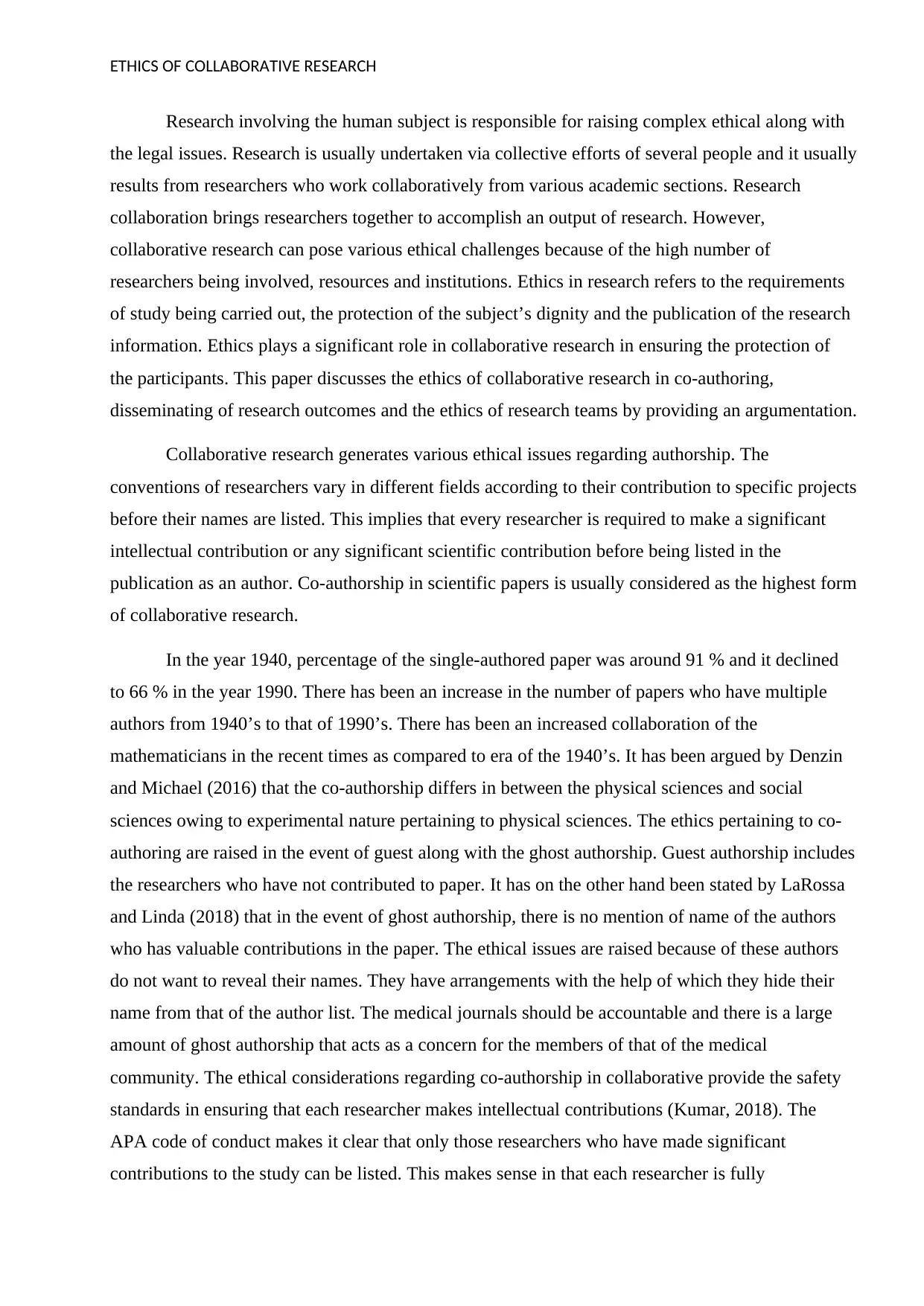
ETHICS OF COLLABORATIVE RESEARCH
Research involving the human subject is responsible for raising complex ethical along with
the legal issues. Research is usually undertaken via collective efforts of several people and it usually
results from researchers who work collaboratively from various academic sections. Research
collaboration brings researchers together to accomplish an output of research. However,
collaborative research can pose various ethical challenges because of the high number of
researchers being involved, resources and institutions. Ethics in research refers to the requirements
of study being carried out, the protection of the subject’s dignity and the publication of the research
information. Ethics plays a significant role in collaborative research in ensuring the protection of
the participants. This paper discusses the ethics of collaborative research in co-authoring,
disseminating of research outcomes and the ethics of research teams by providing an argumentation.
Collaborative research generates various ethical issues regarding authorship. The
conventions of researchers vary in different fields according to their contribution to specific projects
before their names are listed. This implies that every researcher is required to make a significant
intellectual contribution or any significant scientific contribution before being listed in the
publication as an author. Co-authorship in scientific papers is usually considered as the highest form
of collaborative research.
In the year 1940, percentage of the single-authored paper was around 91 % and it declined
to 66 % in the year 1990. There has been an increase in the number of papers who have multiple
authors from 1940’s to that of 1990’s. There has been an increased collaboration of the
mathematicians in the recent times as compared to era of the 1940’s. It has been argued by Denzin
and Michael (2016) that the co-authorship differs in between the physical sciences and social
sciences owing to experimental nature pertaining to physical sciences. The ethics pertaining to co-
authoring are raised in the event of guest along with the ghost authorship. Guest authorship includes
the researchers who have not contributed to paper. It has on the other hand been stated by LaRossa
and Linda (2018) that in the event of ghost authorship, there is no mention of name of the authors
who has valuable contributions in the paper. The ethical issues are raised because of these authors
do not want to reveal their names. They have arrangements with the help of which they hide their
name from that of the author list. The medical journals should be accountable and there is a large
amount of ghost authorship that acts as a concern for the members of that of the medical
community. The ethical considerations regarding co-authorship in collaborative provide the safety
standards in ensuring that each researcher makes intellectual contributions (Kumar, 2018). The
APA code of conduct makes it clear that only those researchers who have made significant
contributions to the study can be listed. This makes sense in that each researcher is fully
Research involving the human subject is responsible for raising complex ethical along with
the legal issues. Research is usually undertaken via collective efforts of several people and it usually
results from researchers who work collaboratively from various academic sections. Research
collaboration brings researchers together to accomplish an output of research. However,
collaborative research can pose various ethical challenges because of the high number of
researchers being involved, resources and institutions. Ethics in research refers to the requirements
of study being carried out, the protection of the subject’s dignity and the publication of the research
information. Ethics plays a significant role in collaborative research in ensuring the protection of
the participants. This paper discusses the ethics of collaborative research in co-authoring,
disseminating of research outcomes and the ethics of research teams by providing an argumentation.
Collaborative research generates various ethical issues regarding authorship. The
conventions of researchers vary in different fields according to their contribution to specific projects
before their names are listed. This implies that every researcher is required to make a significant
intellectual contribution or any significant scientific contribution before being listed in the
publication as an author. Co-authorship in scientific papers is usually considered as the highest form
of collaborative research.
In the year 1940, percentage of the single-authored paper was around 91 % and it declined
to 66 % in the year 1990. There has been an increase in the number of papers who have multiple
authors from 1940’s to that of 1990’s. There has been an increased collaboration of the
mathematicians in the recent times as compared to era of the 1940’s. It has been argued by Denzin
and Michael (2016) that the co-authorship differs in between the physical sciences and social
sciences owing to experimental nature pertaining to physical sciences. The ethics pertaining to co-
authoring are raised in the event of guest along with the ghost authorship. Guest authorship includes
the researchers who have not contributed to paper. It has on the other hand been stated by LaRossa
and Linda (2018) that in the event of ghost authorship, there is no mention of name of the authors
who has valuable contributions in the paper. The ethical issues are raised because of these authors
do not want to reveal their names. They have arrangements with the help of which they hide their
name from that of the author list. The medical journals should be accountable and there is a large
amount of ghost authorship that acts as a concern for the members of that of the medical
community. The ethical considerations regarding co-authorship in collaborative provide the safety
standards in ensuring that each researcher makes intellectual contributions (Kumar, 2018). The
APA code of conduct makes it clear that only those researchers who have made significant
contributions to the study can be listed. This makes sense in that each researcher is fully
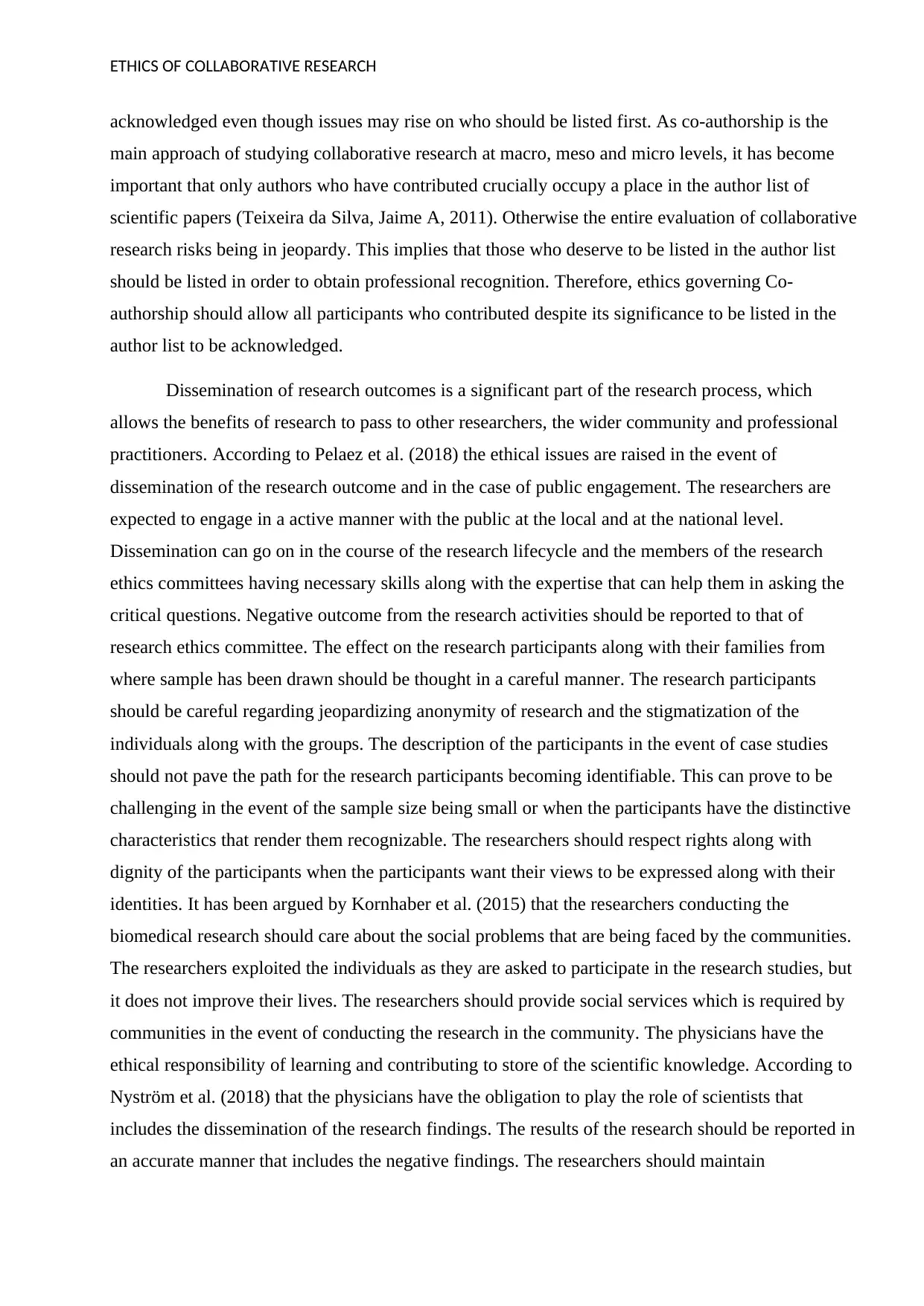
ETHICS OF COLLABORATIVE RESEARCH
acknowledged even though issues may rise on who should be listed first. As co-authorship is the
main approach of studying collaborative research at macro, meso and micro levels, it has become
important that only authors who have contributed crucially occupy a place in the author list of
scientific papers (Teixeira da Silva, Jaime A, 2011). Otherwise the entire evaluation of collaborative
research risks being in jeopardy. This implies that those who deserve to be listed in the author list
should be listed in order to obtain professional recognition. Therefore, ethics governing Co-
authorship should allow all participants who contributed despite its significance to be listed in the
author list to be acknowledged.
Dissemination of research outcomes is a significant part of the research process, which
allows the benefits of research to pass to other researchers, the wider community and professional
practitioners. According to Pelaez et al. (2018) the ethical issues are raised in the event of
dissemination of the research outcome and in the case of public engagement. The researchers are
expected to engage in a active manner with the public at the local and at the national level.
Dissemination can go on in the course of the research lifecycle and the members of the research
ethics committees having necessary skills along with the expertise that can help them in asking the
critical questions. Negative outcome from the research activities should be reported to that of
research ethics committee. The effect on the research participants along with their families from
where sample has been drawn should be thought in a careful manner. The research participants
should be careful regarding jeopardizing anonymity of research and the stigmatization of the
individuals along with the groups. The description of the participants in the event of case studies
should not pave the path for the research participants becoming identifiable. This can prove to be
challenging in the event of the sample size being small or when the participants have the distinctive
characteristics that render them recognizable. The researchers should respect rights along with
dignity of the participants when the participants want their views to be expressed along with their
identities. It has been argued by Kornhaber et al. (2015) that the researchers conducting the
biomedical research should care about the social problems that are being faced by the communities.
The researchers exploited the individuals as they are asked to participate in the research studies, but
it does not improve their lives. The researchers should provide social services which is required by
communities in the event of conducting the research in the community. The physicians have the
ethical responsibility of learning and contributing to store of the scientific knowledge. According to
Nyström et al. (2018) that the physicians have the obligation to play the role of scientists that
includes the dissemination of the research findings. The results of the research should be reported in
an accurate manner that includes the negative findings. The researchers should maintain
acknowledged even though issues may rise on who should be listed first. As co-authorship is the
main approach of studying collaborative research at macro, meso and micro levels, it has become
important that only authors who have contributed crucially occupy a place in the author list of
scientific papers (Teixeira da Silva, Jaime A, 2011). Otherwise the entire evaluation of collaborative
research risks being in jeopardy. This implies that those who deserve to be listed in the author list
should be listed in order to obtain professional recognition. Therefore, ethics governing Co-
authorship should allow all participants who contributed despite its significance to be listed in the
author list to be acknowledged.
Dissemination of research outcomes is a significant part of the research process, which
allows the benefits of research to pass to other researchers, the wider community and professional
practitioners. According to Pelaez et al. (2018) the ethical issues are raised in the event of
dissemination of the research outcome and in the case of public engagement. The researchers are
expected to engage in a active manner with the public at the local and at the national level.
Dissemination can go on in the course of the research lifecycle and the members of the research
ethics committees having necessary skills along with the expertise that can help them in asking the
critical questions. Negative outcome from the research activities should be reported to that of
research ethics committee. The effect on the research participants along with their families from
where sample has been drawn should be thought in a careful manner. The research participants
should be careful regarding jeopardizing anonymity of research and the stigmatization of the
individuals along with the groups. The description of the participants in the event of case studies
should not pave the path for the research participants becoming identifiable. This can prove to be
challenging in the event of the sample size being small or when the participants have the distinctive
characteristics that render them recognizable. The researchers should respect rights along with
dignity of the participants when the participants want their views to be expressed along with their
identities. It has been argued by Kornhaber et al. (2015) that the researchers conducting the
biomedical research should care about the social problems that are being faced by the communities.
The researchers exploited the individuals as they are asked to participate in the research studies, but
it does not improve their lives. The researchers should provide social services which is required by
communities in the event of conducting the research in the community. The physicians have the
ethical responsibility of learning and contributing to store of the scientific knowledge. According to
Nyström et al. (2018) that the physicians have the obligation to play the role of scientists that
includes the dissemination of the research findings. The results of the research should be reported in
an accurate manner that includes the negative findings. The researchers should maintain
⊘ This is a preview!⊘
Do you want full access?
Subscribe today to unlock all pages.

Trusted by 1+ million students worldwide
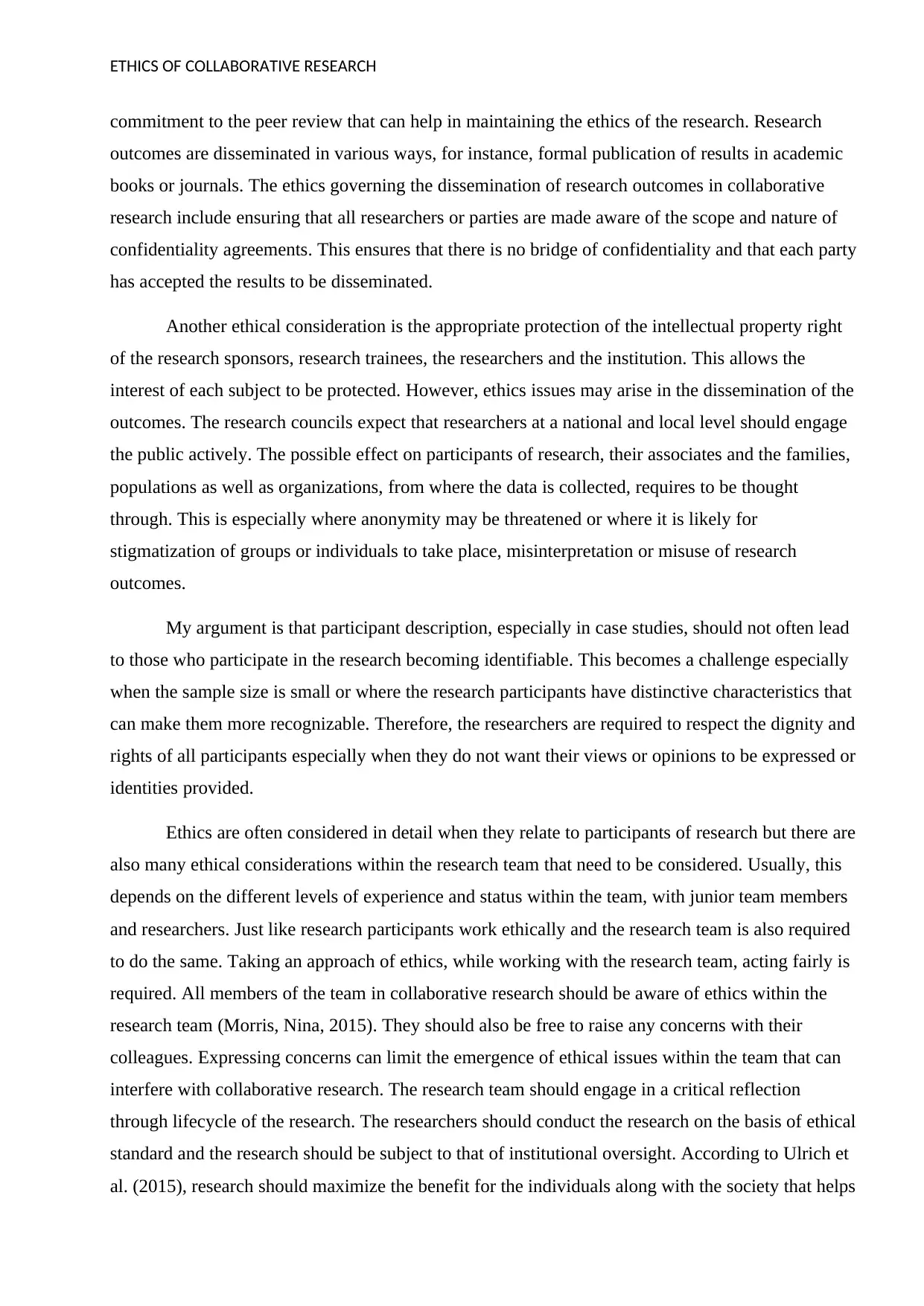
ETHICS OF COLLABORATIVE RESEARCH
commitment to the peer review that can help in maintaining the ethics of the research. Research
outcomes are disseminated in various ways, for instance, formal publication of results in academic
books or journals. The ethics governing the dissemination of research outcomes in collaborative
research include ensuring that all researchers or parties are made aware of the scope and nature of
confidentiality agreements. This ensures that there is no bridge of confidentiality and that each party
has accepted the results to be disseminated.
Another ethical consideration is the appropriate protection of the intellectual property right
of the research sponsors, research trainees, the researchers and the institution. This allows the
interest of each subject to be protected. However, ethics issues may arise in the dissemination of the
outcomes. The research councils expect that researchers at a national and local level should engage
the public actively. The possible effect on participants of research, their associates and the families,
populations as well as organizations, from where the data is collected, requires to be thought
through. This is especially where anonymity may be threatened or where it is likely for
stigmatization of groups or individuals to take place, misinterpretation or misuse of research
outcomes.
My argument is that participant description, especially in case studies, should not often lead
to those who participate in the research becoming identifiable. This becomes a challenge especially
when the sample size is small or where the research participants have distinctive characteristics that
can make them more recognizable. Therefore, the researchers are required to respect the dignity and
rights of all participants especially when they do not want their views or opinions to be expressed or
identities provided.
Ethics are often considered in detail when they relate to participants of research but there are
also many ethical considerations within the research team that need to be considered. Usually, this
depends on the different levels of experience and status within the team, with junior team members
and researchers. Just like research participants work ethically and the research team is also required
to do the same. Taking an approach of ethics, while working with the research team, acting fairly is
required. All members of the team in collaborative research should be aware of ethics within the
research team (Morris, Nina, 2015). They should also be free to raise any concerns with their
colleagues. Expressing concerns can limit the emergence of ethical issues within the team that can
interfere with collaborative research. The research team should engage in a critical reflection
through lifecycle of the research. The researchers should conduct the research on the basis of ethical
standard and the research should be subject to that of institutional oversight. According to Ulrich et
al. (2015), research should maximize the benefit for the individuals along with the society that helps
commitment to the peer review that can help in maintaining the ethics of the research. Research
outcomes are disseminated in various ways, for instance, formal publication of results in academic
books or journals. The ethics governing the dissemination of research outcomes in collaborative
research include ensuring that all researchers or parties are made aware of the scope and nature of
confidentiality agreements. This ensures that there is no bridge of confidentiality and that each party
has accepted the results to be disseminated.
Another ethical consideration is the appropriate protection of the intellectual property right
of the research sponsors, research trainees, the researchers and the institution. This allows the
interest of each subject to be protected. However, ethics issues may arise in the dissemination of the
outcomes. The research councils expect that researchers at a national and local level should engage
the public actively. The possible effect on participants of research, their associates and the families,
populations as well as organizations, from where the data is collected, requires to be thought
through. This is especially where anonymity may be threatened or where it is likely for
stigmatization of groups or individuals to take place, misinterpretation or misuse of research
outcomes.
My argument is that participant description, especially in case studies, should not often lead
to those who participate in the research becoming identifiable. This becomes a challenge especially
when the sample size is small or where the research participants have distinctive characteristics that
can make them more recognizable. Therefore, the researchers are required to respect the dignity and
rights of all participants especially when they do not want their views or opinions to be expressed or
identities provided.
Ethics are often considered in detail when they relate to participants of research but there are
also many ethical considerations within the research team that need to be considered. Usually, this
depends on the different levels of experience and status within the team, with junior team members
and researchers. Just like research participants work ethically and the research team is also required
to do the same. Taking an approach of ethics, while working with the research team, acting fairly is
required. All members of the team in collaborative research should be aware of ethics within the
research team (Morris, Nina, 2015). They should also be free to raise any concerns with their
colleagues. Expressing concerns can limit the emergence of ethical issues within the team that can
interfere with collaborative research. The research team should engage in a critical reflection
through lifecycle of the research. The researchers should conduct the research on the basis of ethical
standard and the research should be subject to that of institutional oversight. According to Ulrich et
al. (2015), research should maximize the benefit for the individuals along with the society that helps
Paraphrase This Document
Need a fresh take? Get an instant paraphrase of this document with our AI Paraphraser
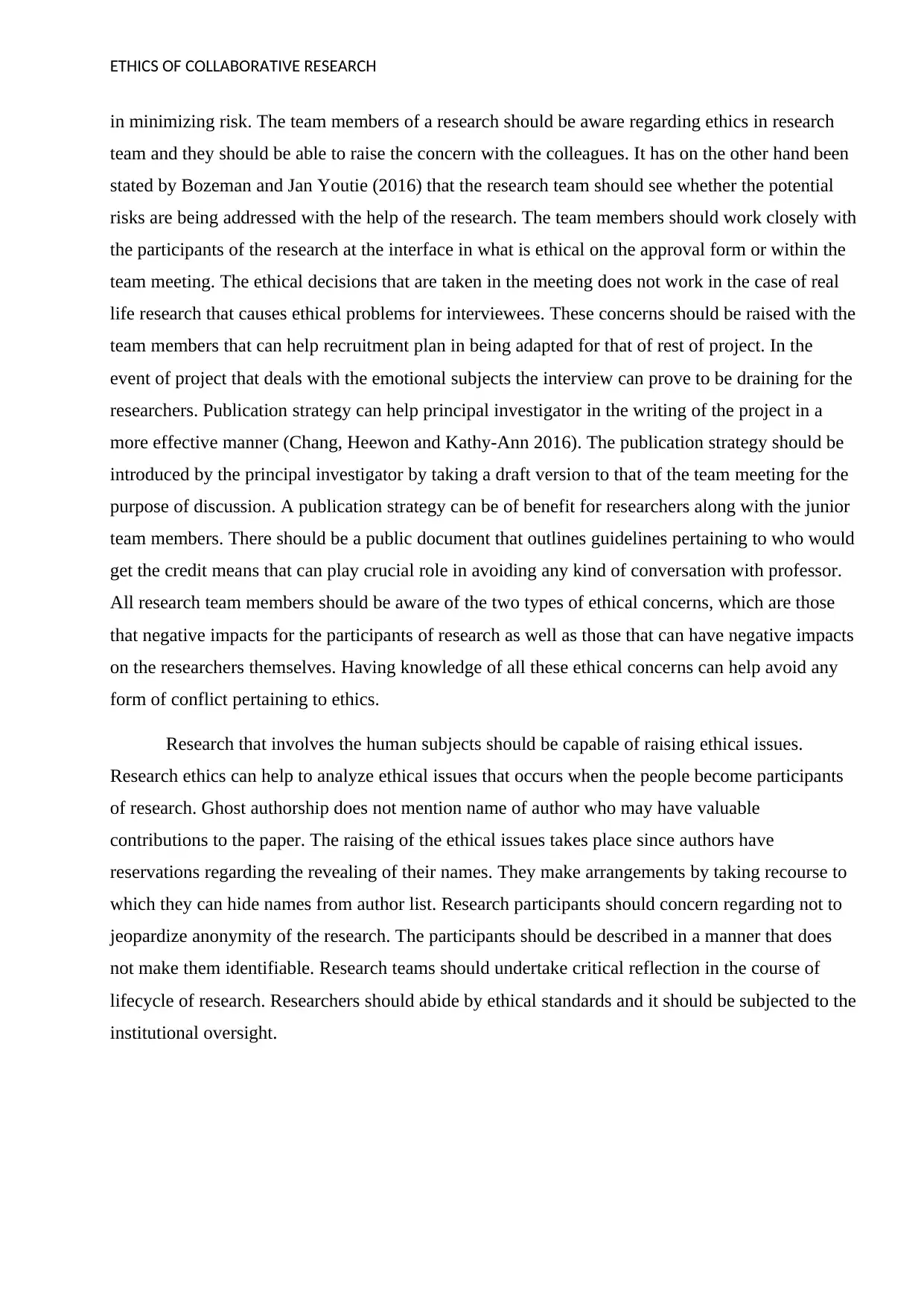
ETHICS OF COLLABORATIVE RESEARCH
in minimizing risk. The team members of a research should be aware regarding ethics in research
team and they should be able to raise the concern with the colleagues. It has on the other hand been
stated by Bozeman and Jan Youtie (2016) that the research team should see whether the potential
risks are being addressed with the help of the research. The team members should work closely with
the participants of the research at the interface in what is ethical on the approval form or within the
team meeting. The ethical decisions that are taken in the meeting does not work in the case of real
life research that causes ethical problems for interviewees. These concerns should be raised with the
team members that can help recruitment plan in being adapted for that of rest of project. In the
event of project that deals with the emotional subjects the interview can prove to be draining for the
researchers. Publication strategy can help principal investigator in the writing of the project in a
more effective manner (Chang, Heewon and Kathy-Ann 2016). The publication strategy should be
introduced by the principal investigator by taking a draft version to that of the team meeting for the
purpose of discussion. A publication strategy can be of benefit for researchers along with the junior
team members. There should be a public document that outlines guidelines pertaining to who would
get the credit means that can play crucial role in avoiding any kind of conversation with professor.
All research team members should be aware of the two types of ethical concerns, which are those
that negative impacts for the participants of research as well as those that can have negative impacts
on the researchers themselves. Having knowledge of all these ethical concerns can help avoid any
form of conflict pertaining to ethics.
Research that involves the human subjects should be capable of raising ethical issues.
Research ethics can help to analyze ethical issues that occurs when the people become participants
of research. Ghost authorship does not mention name of author who may have valuable
contributions to the paper. The raising of the ethical issues takes place since authors have
reservations regarding the revealing of their names. They make arrangements by taking recourse to
which they can hide names from author list. Research participants should concern regarding not to
jeopardize anonymity of the research. The participants should be described in a manner that does
not make them identifiable. Research teams should undertake critical reflection in the course of
lifecycle of research. Researchers should abide by ethical standards and it should be subjected to the
institutional oversight.
in minimizing risk. The team members of a research should be aware regarding ethics in research
team and they should be able to raise the concern with the colleagues. It has on the other hand been
stated by Bozeman and Jan Youtie (2016) that the research team should see whether the potential
risks are being addressed with the help of the research. The team members should work closely with
the participants of the research at the interface in what is ethical on the approval form or within the
team meeting. The ethical decisions that are taken in the meeting does not work in the case of real
life research that causes ethical problems for interviewees. These concerns should be raised with the
team members that can help recruitment plan in being adapted for that of rest of project. In the
event of project that deals with the emotional subjects the interview can prove to be draining for the
researchers. Publication strategy can help principal investigator in the writing of the project in a
more effective manner (Chang, Heewon and Kathy-Ann 2016). The publication strategy should be
introduced by the principal investigator by taking a draft version to that of the team meeting for the
purpose of discussion. A publication strategy can be of benefit for researchers along with the junior
team members. There should be a public document that outlines guidelines pertaining to who would
get the credit means that can play crucial role in avoiding any kind of conversation with professor.
All research team members should be aware of the two types of ethical concerns, which are those
that negative impacts for the participants of research as well as those that can have negative impacts
on the researchers themselves. Having knowledge of all these ethical concerns can help avoid any
form of conflict pertaining to ethics.
Research that involves the human subjects should be capable of raising ethical issues.
Research ethics can help to analyze ethical issues that occurs when the people become participants
of research. Ghost authorship does not mention name of author who may have valuable
contributions to the paper. The raising of the ethical issues takes place since authors have
reservations regarding the revealing of their names. They make arrangements by taking recourse to
which they can hide names from author list. Research participants should concern regarding not to
jeopardize anonymity of the research. The participants should be described in a manner that does
not make them identifiable. Research teams should undertake critical reflection in the course of
lifecycle of research. Researchers should abide by ethical standards and it should be subjected to the
institutional oversight.
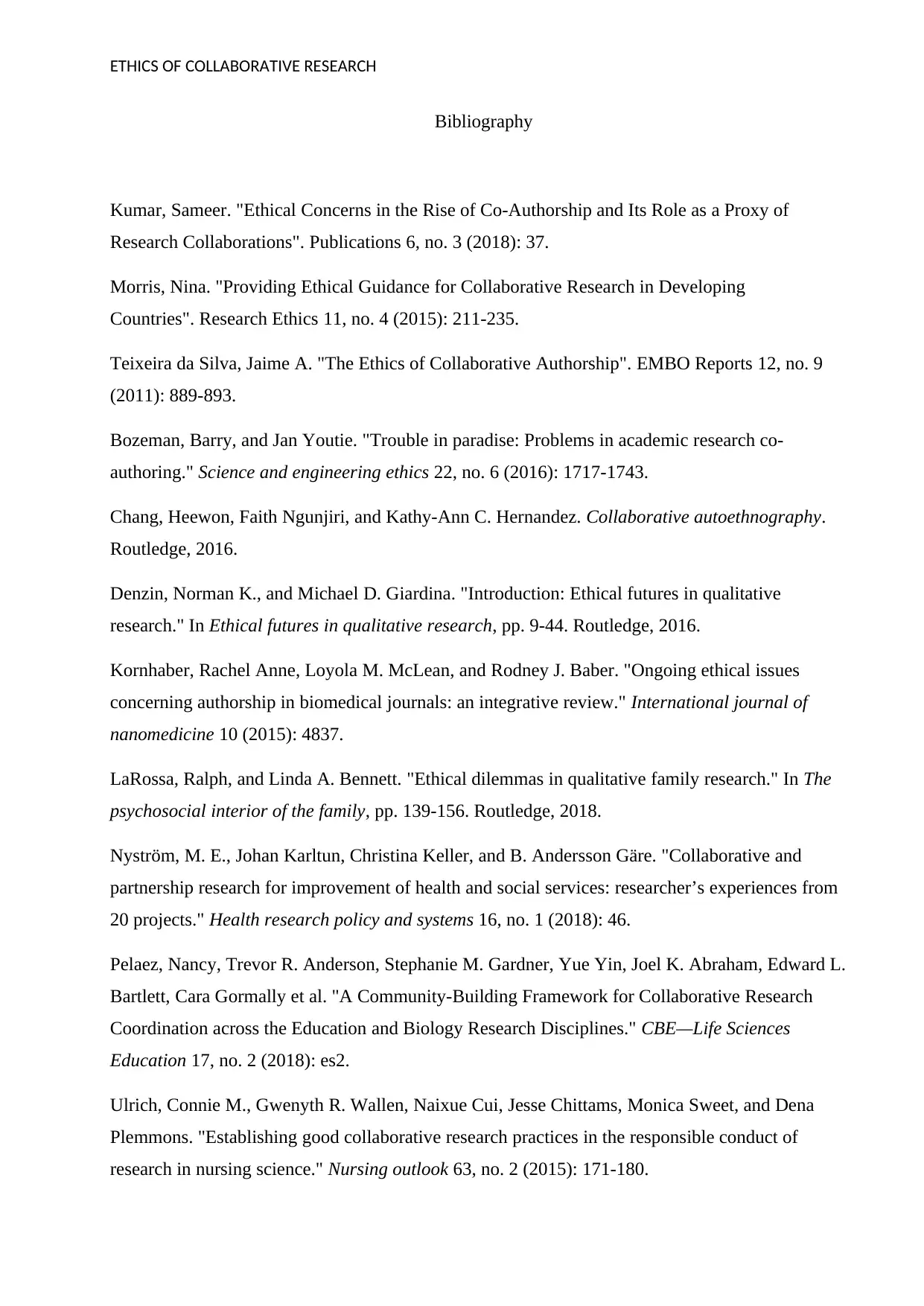
ETHICS OF COLLABORATIVE RESEARCH
Bibliography
Kumar, Sameer. "Ethical Concerns in the Rise of Co-Authorship and Its Role as a Proxy of
Research Collaborations". Publications 6, no. 3 (2018): 37.
Morris, Nina. "Providing Ethical Guidance for Collaborative Research in Developing
Countries". Research Ethics 11, no. 4 (2015): 211-235.
Teixeira da Silva, Jaime A. "The Ethics of Collaborative Authorship". EMBO Reports 12, no. 9
(2011): 889-893.
Bozeman, Barry, and Jan Youtie. "Trouble in paradise: Problems in academic research co-
authoring." Science and engineering ethics 22, no. 6 (2016): 1717-1743.
Chang, Heewon, Faith Ngunjiri, and Kathy-Ann C. Hernandez. Collaborative autoethnography.
Routledge, 2016.
Denzin, Norman K., and Michael D. Giardina. "Introduction: Ethical futures in qualitative
research." In Ethical futures in qualitative research, pp. 9-44. Routledge, 2016.
Kornhaber, Rachel Anne, Loyola M. McLean, and Rodney J. Baber. "Ongoing ethical issues
concerning authorship in biomedical journals: an integrative review." International journal of
nanomedicine 10 (2015): 4837.
LaRossa, Ralph, and Linda A. Bennett. "Ethical dilemmas in qualitative family research." In The
psychosocial interior of the family, pp. 139-156. Routledge, 2018.
Nyström, M. E., Johan Karltun, Christina Keller, and B. Andersson Gäre. "Collaborative and
partnership research for improvement of health and social services: researcher’s experiences from
20 projects." Health research policy and systems 16, no. 1 (2018): 46.
Pelaez, Nancy, Trevor R. Anderson, Stephanie M. Gardner, Yue Yin, Joel K. Abraham, Edward L.
Bartlett, Cara Gormally et al. "A Community-Building Framework for Collaborative Research
Coordination across the Education and Biology Research Disciplines." CBE—Life Sciences
Education 17, no. 2 (2018): es2.
Ulrich, Connie M., Gwenyth R. Wallen, Naixue Cui, Jesse Chittams, Monica Sweet, and Dena
Plemmons. "Establishing good collaborative research practices in the responsible conduct of
research in nursing science." Nursing outlook 63, no. 2 (2015): 171-180.
Bibliography
Kumar, Sameer. "Ethical Concerns in the Rise of Co-Authorship and Its Role as a Proxy of
Research Collaborations". Publications 6, no. 3 (2018): 37.
Morris, Nina. "Providing Ethical Guidance for Collaborative Research in Developing
Countries". Research Ethics 11, no. 4 (2015): 211-235.
Teixeira da Silva, Jaime A. "The Ethics of Collaborative Authorship". EMBO Reports 12, no. 9
(2011): 889-893.
Bozeman, Barry, and Jan Youtie. "Trouble in paradise: Problems in academic research co-
authoring." Science and engineering ethics 22, no. 6 (2016): 1717-1743.
Chang, Heewon, Faith Ngunjiri, and Kathy-Ann C. Hernandez. Collaborative autoethnography.
Routledge, 2016.
Denzin, Norman K., and Michael D. Giardina. "Introduction: Ethical futures in qualitative
research." In Ethical futures in qualitative research, pp. 9-44. Routledge, 2016.
Kornhaber, Rachel Anne, Loyola M. McLean, and Rodney J. Baber. "Ongoing ethical issues
concerning authorship in biomedical journals: an integrative review." International journal of
nanomedicine 10 (2015): 4837.
LaRossa, Ralph, and Linda A. Bennett. "Ethical dilemmas in qualitative family research." In The
psychosocial interior of the family, pp. 139-156. Routledge, 2018.
Nyström, M. E., Johan Karltun, Christina Keller, and B. Andersson Gäre. "Collaborative and
partnership research for improvement of health and social services: researcher’s experiences from
20 projects." Health research policy and systems 16, no. 1 (2018): 46.
Pelaez, Nancy, Trevor R. Anderson, Stephanie M. Gardner, Yue Yin, Joel K. Abraham, Edward L.
Bartlett, Cara Gormally et al. "A Community-Building Framework for Collaborative Research
Coordination across the Education and Biology Research Disciplines." CBE—Life Sciences
Education 17, no. 2 (2018): es2.
Ulrich, Connie M., Gwenyth R. Wallen, Naixue Cui, Jesse Chittams, Monica Sweet, and Dena
Plemmons. "Establishing good collaborative research practices in the responsible conduct of
research in nursing science." Nursing outlook 63, no. 2 (2015): 171-180.
⊘ This is a preview!⊘
Do you want full access?
Subscribe today to unlock all pages.

Trusted by 1+ million students worldwide
1 out of 6
Related Documents
Your All-in-One AI-Powered Toolkit for Academic Success.
+13062052269
info@desklib.com
Available 24*7 on WhatsApp / Email
![[object Object]](/_next/static/media/star-bottom.7253800d.svg)
Unlock your academic potential
Copyright © 2020–2026 A2Z Services. All Rights Reserved. Developed and managed by ZUCOL.


